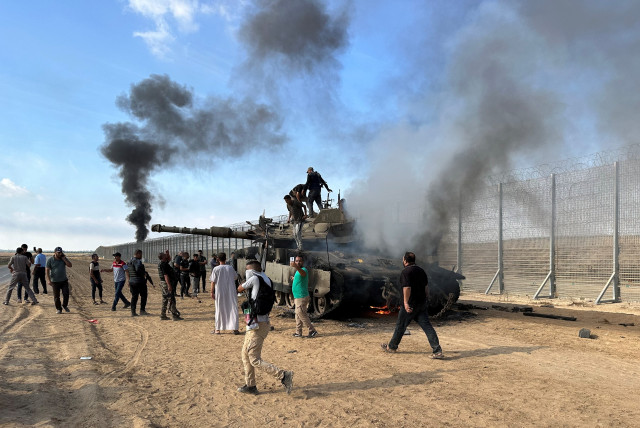President Herzog hands out awards to civilian heroes of Israel

Prior to the presentation of each award, a video was shown in which the heroes and heroines or close relatives of those who had been murdered were interviewed in their homes or in the fields nearby.
Civilian heroes who were among the first group of recipients of the President’s Award for Civilian Heroism on Wednesday evening were united in their belief that their actions were not heroic but rather the right thing to do.
Even bereaved wives, siblings, offspring, and mothers concurred that this was the attitude of their menfolk and something that they, too, understood and believed in.
The general comment by both Muslim and Jewish honorees was that the values on which they had been raised were what guided their actions.
They grew up with the ideal that if anyone was in trouble, it was their duty to help.
Each person in this small group rushed to the rescue on October 7. Each of them responded without hesitation to the crisis in various areas of the Gaza border communities.
They, along with other rescuers who were murdered by Hamas, collectively saved hundreds of lives.
While visiting the scenes of devastation, President Isaac Herzog and his wife Michal heard countless stories about ordinary people who did extraordinary things at great risk. Many had even sacrificed their own lives to save people they didn’t know.
This wealth of stories prompted Herzog to initiate The President’s Award for Civilian Heroism, which, he said on Wednesday, will continue to be conferred by him and future presidents.
ELYAKIM RUBINSTEIN, a retired Supreme Court Justice and former attorney-general, headed an advisory committee that Herzog established. It included Jewish and Arab members.
According to Rubinstein, the lack of a framework for civilian awards, in contrast to the laws that govern military and security service awards, made it difficult to determine who qualified for the award due to the large number of nominations.
Although there was plenty of room for all the attendees in the main hall of the President’s Residence, the event was held in the grounds outside in the cold Jerusalem night air. Blankets distributed by way of compensation were thin and provided little relief.
However, the theatrical effects that had been set up were too large to be effective indoors.
Outdoors at night, the attendees faced a mega screen with dramatic lighting effects and smoke rising on both sides that symbolized the burning of homes and other buildings, images of stones and rubble, and three large national flags on either side of the screen – as if, on the one hand, to symbolize the six-pointed Star of David, and on the other hand, a semblance of normalcy that existed on October 6, with no hint (other than the ignored warnings of the female observers) of what would transpire on October 7.
Prior to the presentation of each award, a video was shown in which the heroes and heroines or close relatives of those who had been murdered were interviewed in their homes or in the fields nearby.
Each interview was emotionally uplifting. Whether religious or secular, Jewish or Muslim, everyone spoke in a quiet spirit of patriotism.
Proud to be citizens of Israel
Even the Bedouin honorees said they were proud to be citizens of Israel, loved the land, and were interested in friendship and peace with their Jewish neighbors.
The four Bedouin Kirinawi cousins from Rahat ran to rescue another cousin, Hisham, in Kibbutz Be’eri. On the way, they saw hundreds of people fleeing from the Hamas onslaught.
Unwilling to ignore them, they loaded as many people as possible into their vehicle, drove them to safety, then returned and repeated the process.
Saving lives
They managed to save somewhere between 30 and 40 people.
Other award recipients included the late Moshe and Eliad Ohayon; Yusef Azayadna; Omer Bar and his late father, Lion; Oz Davidan; Tali Hadad; the late Amit Man; Nirit Hunwald-Kornfeld; the late Dr. Daniel Levy; the late brothers Noam and Ishai Slotki; Moti Ezra; Dhish Ismail; the late Ben Binyamin Shimoni; the young Idan siblings, whose parents had been murdered in front of their eyes; the Tassa family; and the daughters of the Suissa family.
Each award consisted of a framed citation and a statuette designed by Jerusalem Judaica artist Sari Srulovitch.
Speaking on behalf of the recipients, Hunwald-Kornfeld said that as soon as she heard about the Hamas invasion, she leapt into her car to see what she could do to help the injured.
She also called Amit Man and Daniel Levy to join her. They believed they would do what was necessary until the MDA and army arrived, at which point the trio could go home.
But the MDA and the army did not arrive. Man and Levy were murdered. Not a day passes without Hunwald-Kornfeld thinking about them and how they died.
The event opened with famous singer Rita, clad in black and singing in a soft voice, barely above a whisper, which was not her usual style but conveyed the sadness of the nation.
Jerusalem Post Store
`; document.getElementById("linkPremium").innerHTML = cont; var divWithLink = document.getElementById("premium-link"); if (divWithLink !== null && divWithLink !== 'undefined') { divWithLink.style.border = "solid 1px #cb0f3e"; divWithLink.style.textAlign = "center"; divWithLink.style.marginBottom = "15px"; divWithLink.style.marginTop = "15px"; divWithLink.style.width = "100%"; divWithLink.style.backgroundColor = "#122952"; divWithLink.style.color = "#ffffff"; divWithLink.style.lineHeight = "1.5"; } } (function (v, i) { });

